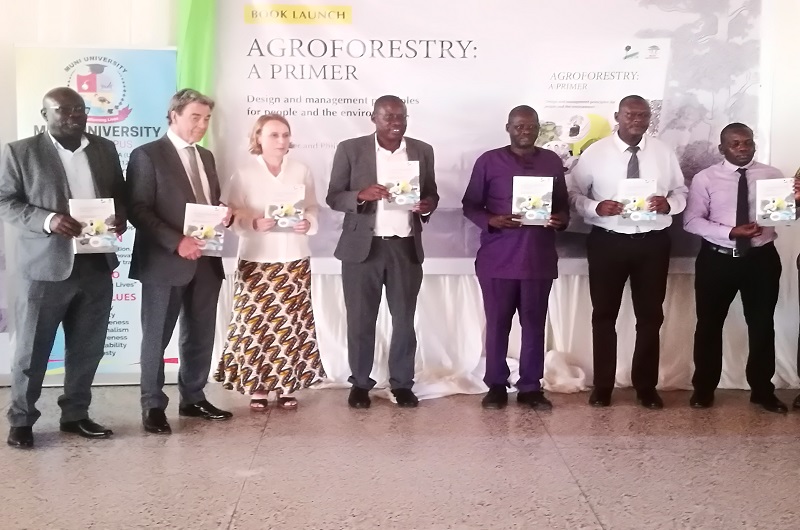BY ANDREW COHEN AMVESI
ARUA. On Friday February 24, 2023, the people of West Nile witnessed the launch of a book titled, ‘Agroforestry: A Primer. Design and management principles for people and the environment.”
The 180-page book authored by Anja Gassner and Philip Dobie was officially launched at Muni University in Arua City during a colorful function that attracted several dignitaries including pupils and students from the neighboring primary and secondary schools. But what does the launch of the book mean to the people of West Nile?
According to Assoc. Prof. Clement Okia, a specialist in Agroforestry at Muni University, the launch of the book will go a long way to see that there is a deliberate effort made to integrate trees in the farming system in West Nile and beyond.

“We have reached a point in our lives to say okay, the forests and the national parks are reducing, we can actually have trees and agriculture on the same piece of land and that is what we call Agroforestry. Deliberately integrating trees in the farming system and in this, we say not every tree but we do a careful selection of trees,” Okia, a co-author of the book said.
“We shall begin from there and say if you plant eucalyptus, it will bring problems but there is another tree that we can use to replace the eucalyptus that can grow with tobacco, you grow sorghum or you grow cassava with the tree and it will do well,” Okia added.

Erik Francis Acanakwo, the country representative for Centre of International Forestry Research and International Centre for Research in Agroforestry (CIFOR – ICRAF), a scientific institution that supported the publication of the book, said it is a very important book that has been made to simplify the terms that would otherwise be complex; its forestry on one side and agriculture on the other but now merged.
“The beauty about the book is its level of simplicity and that is the reason you shouldn’t be surprised to see primary school pupils mixing with Professors and University students. The simplicity of the way it is produced is what makes my heart joyful; it will be easy to be used by an extension worker, a student, the teacher, University student – there is a wealth of knowledge in this book,” Acanakwo said.

Similarly, Nola Avako, the Maracha district senior environment officer, promised that they are going to rely mainly on the book to direct farmers on the types of trees they can plant.
“Several times, farmers have been complaining when you tell them why you don’t leave trees on your farm, they are like no …no…no the types of crops we plant don’t allow trees to be amidst them. But when you look at this book, you will see that there are some trees which actually grow together with crops. Before, it has been so difficult for us foresters to reach farmers directly because we have set structures. So, usually we talk through Agriculture officers to relay our information to farmers on ground but with this, we are going to be in touch with the agriculture extension workers so that we can send more information on how to integrate trees with crops,” Avako said.
Patrick Hans Igulot, the regional coordinator of forestry in northern Uganda under the ministry of water and environment said Uganda has lost all the indigenous tree species and now they are trying to replace them by planting the exotic species.
“As much as our forest cover is increasing from 9 per cent in 2015, we are now at 13.6 percent from 24 percent in 1990 but that small increase is more because of the conservation policy, so still we need to do a lot. Agroforestry really sits at the center of the two sectors of forestry and agriculture and I have no doubt that we have to work together and move this fight forward,” Igulot said.
In his remarks read by Dr. Geofry Andogah, the dean of the Faculty of Technoscience, Prof. Simon Anguma Katrini, the Muni University Vice Chancellor said the launch of the book is yet another milestone in the growth trajectory of Muni University.
“This exercise is practically significant because it marks the end of vigorous activities that have resulted in the production of the book we are launching today. The book has been published timely to create awareness on emerging issues of global concern. We are facing the global challenge of climate change, wide spread degradation of land and water resources and loss of biodiversity. All these challenges lead to famine through production systems,” Katrini said.
“At the continental and national levels, we are facing challenges of dwindling vegetation cover, declining soil fertility, low crop yields, food and livelihood insecurity, and general impacts of climate change. These challenges are more ex-simplified at the local levels here in the West Nile region. The environment is becoming hostile and it is threatening human survival,” Katrini added.
The background of the book, according to Dobie, is that globally, there are huge changes going on around the world. He said about 50 per cent of the land that used to be forests, grassland, natural land has been destroyed and now people are producing food at the cost of land and biodiversity, a problem the book seeks to address.

